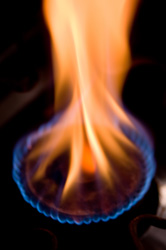Safer hydrogen fuel handling
Adding hydrogen to natural gas, the main constituent of which is methane, allows for cleaner combustion at lower temperatures. However, hydrogen-containing fuels exhibit specific behaviour – so called preferential diffusion effects – caused by the high diffusivity of hydrogen. The 'Stretch effects on hydrogen/methane/air laminar flame propagation and extinction' (Strela) scientists are therefore working to examine how these effects influence the propagation and extinction of fuel-lean methane-hydrogen-air (hythane-air) flames. After carrying out a series of experiments, the scientists found that for all hydrogen-containing mixtures, the lean flammability limits were much wider than the minimum fuel concentrations at which adiabatic planar flames could propagate. Moreover, unexpectedly, a variety of qualitatively different regimes were observed for ultra-lean flames as researchers varied the parameters of the experiments. An important outcome of the Strela project was the design of a prototype burner which allowed researchers to stabilise ultra-lean sub-limit flames. This burner could be used in further studies to examine the fundamental preferential diffusion effect. 'Such studies would be of significant potential value for the better understanding and correct modelling of lean combustion of hydrogen-containing fuels in practical devices,' noted the scientists. In the meantime, they noted that the results of this project could be used to establish safety standards for the production, storage, delivery and distribution of hythane-air blends.







